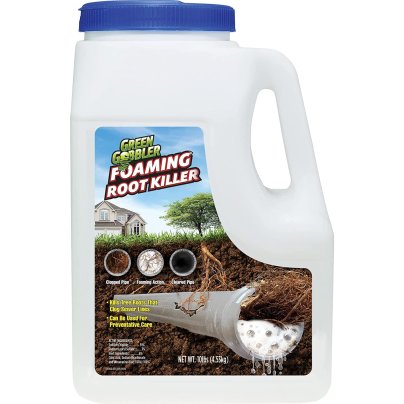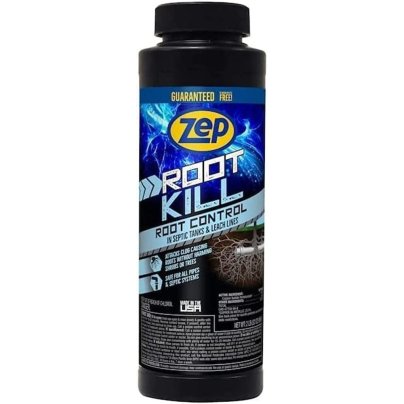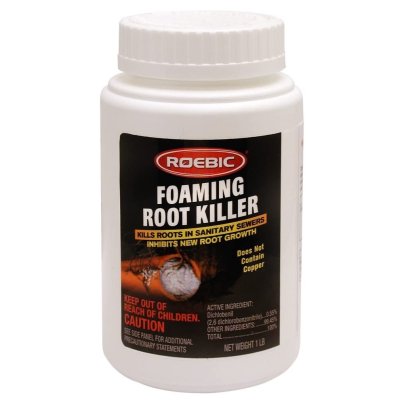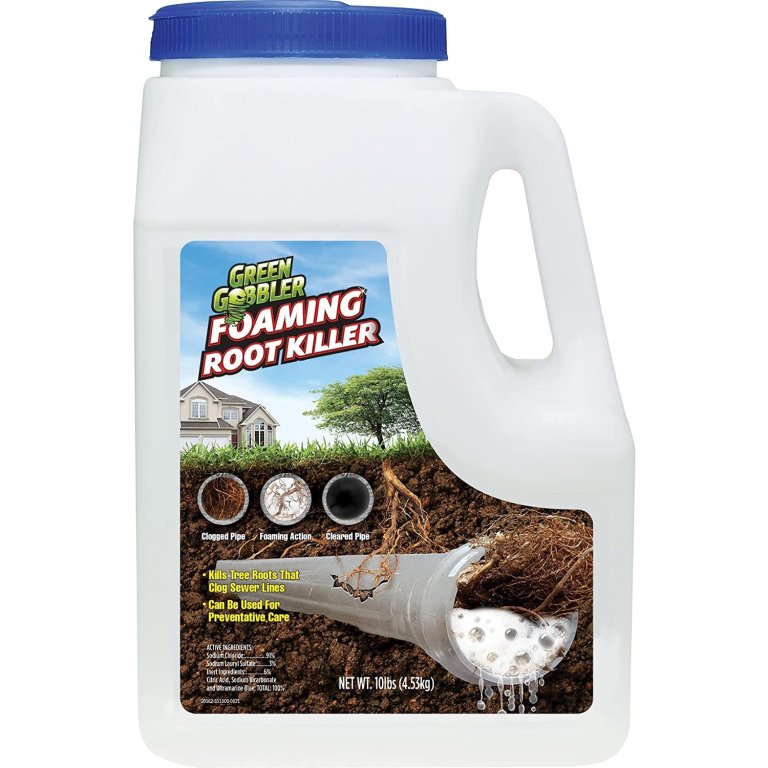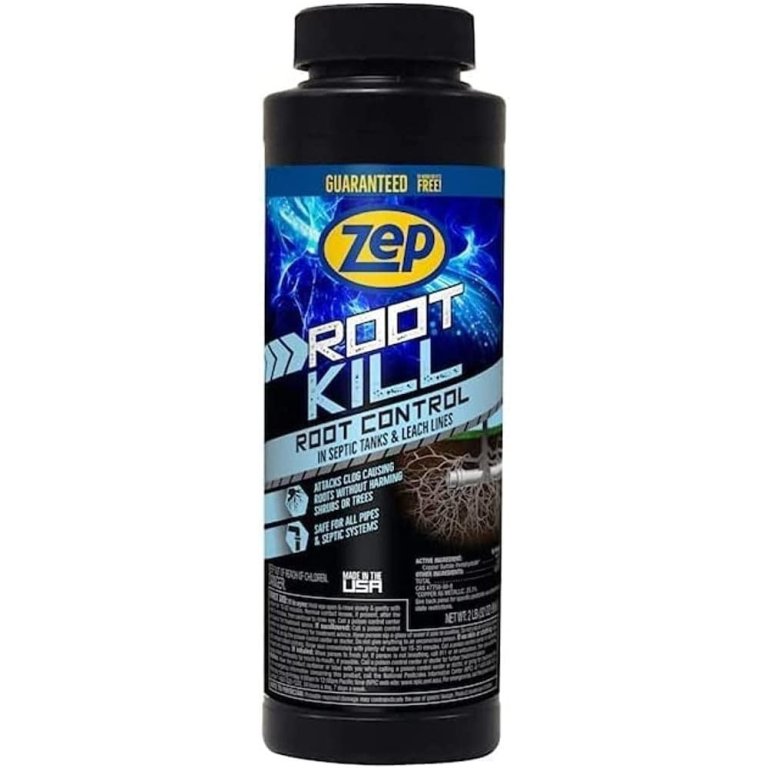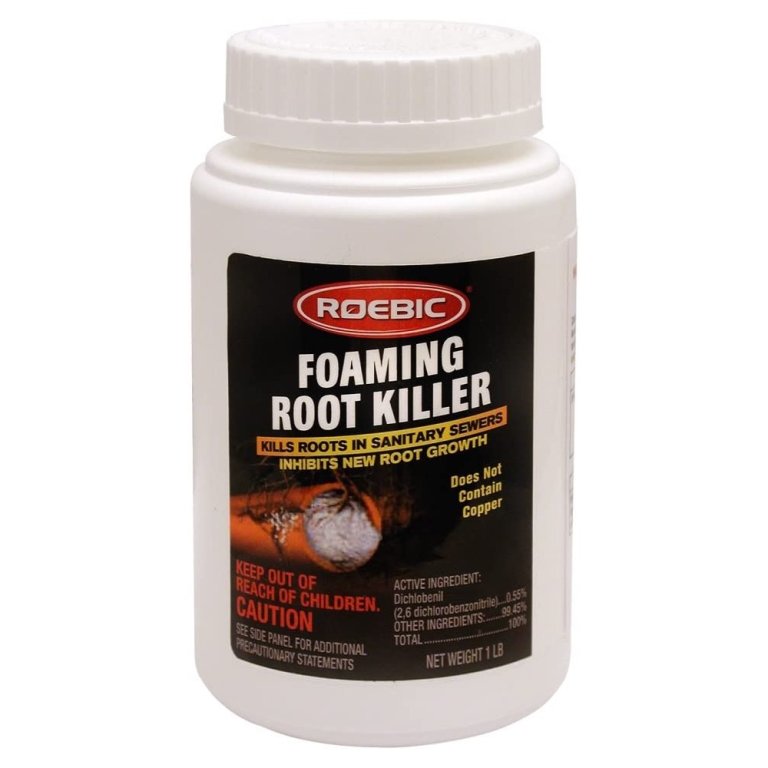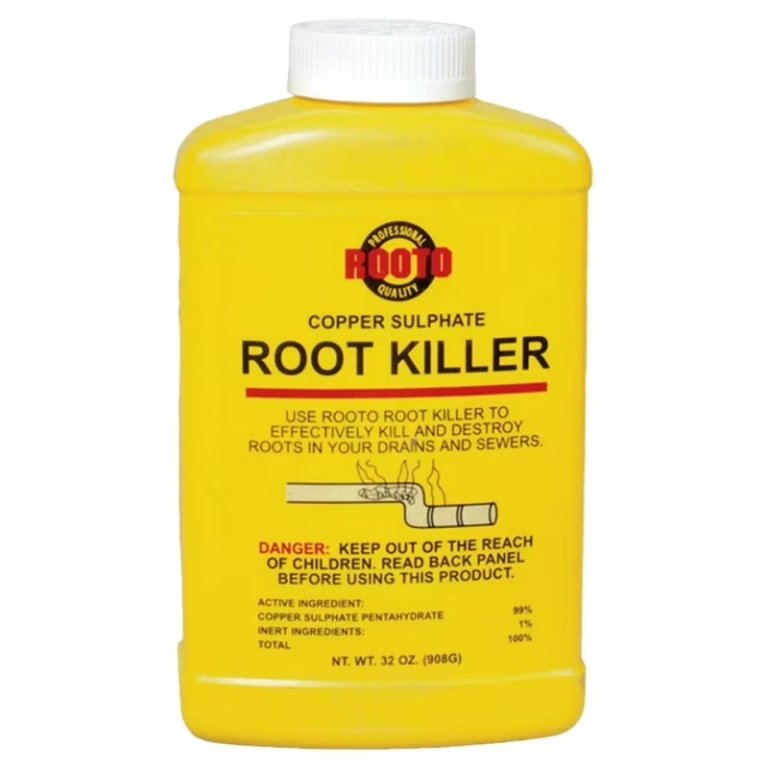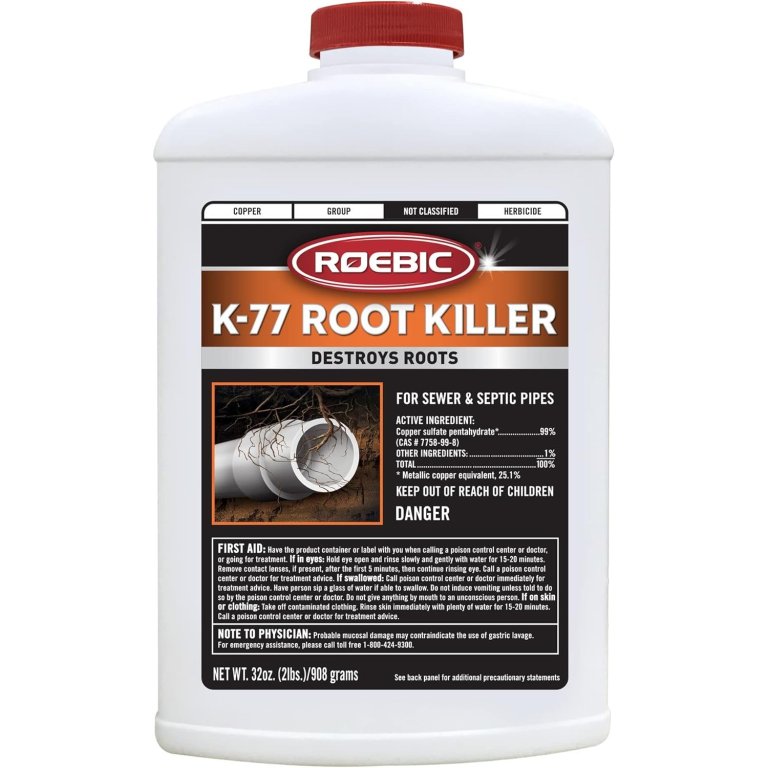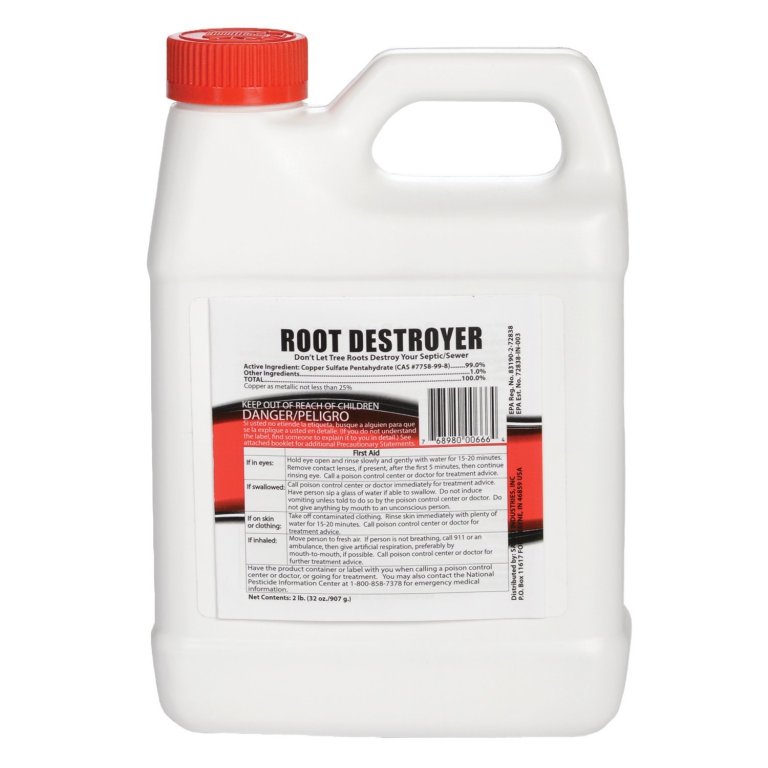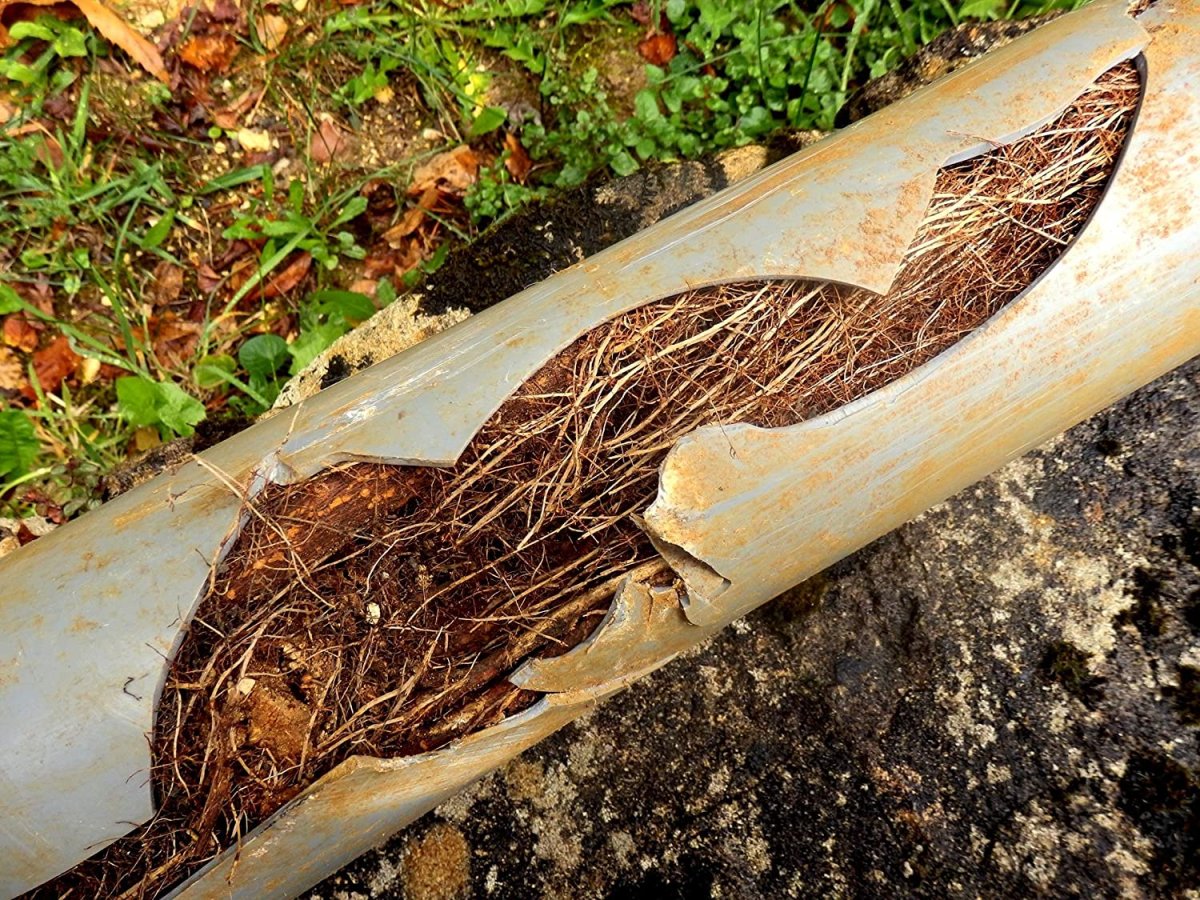
We may earn revenue from the products available on this page and participate in affiliate programs. Learn More ›
If you’re noticing slowly draining bathtubs and sinks or frequent toilet backups that don’t seem like run-of-the-mill clogs, a root killer for sewer lines might be the solution—especially if large trees are growing near your home. As trees mature, their roots can invade your home’s main drainage pipe, eventually causing a serious blockage. If caught early, an inexpensive root killer can clear the problem and save you from needing to hire a costly professional plumber.
Root killers are chemicals you simply flush down the toilet. Once the chemicals find their way to the offending tree roots, they latch on and kill them without harming the rest of the tree. Over a period of days or weeks, the problem roots rot and wither away, opening the drain.
To help identify the most effective root killers, we researched dozens of popular options and spoke with a plumbing expert to get their advice on what works, what to avoid, and how to use these products safely. Based on our efforts, we selected the Green Gobbler Foaming Root Killer as our top pick for its effective natural ingredients and easy application. Ahead, learn more about what to look for in these drain-clearing products and find out which are the best root killers for sewer lines on the market.
- BEST OVERALL: Green Gobbler Foaming Root Killer
↓ Jump to Review - BEST BANG FOR THE BUCK: Zep Root Kill
↓ Jump to Review - BEST FOAMING: Roebic Foaming Root Killer
↓ Jump to Review - ECO-FRIENDLY PICK: Rooto Copper Sulfate Root Killer
↓ Jump to Review - BEST HEAVY-DUTY: Roebic K-77 Root Killer
↓ Jump to Review - ALSO CONSIDER: Sanco Industries Root Destroyer
↓ Jump to Review
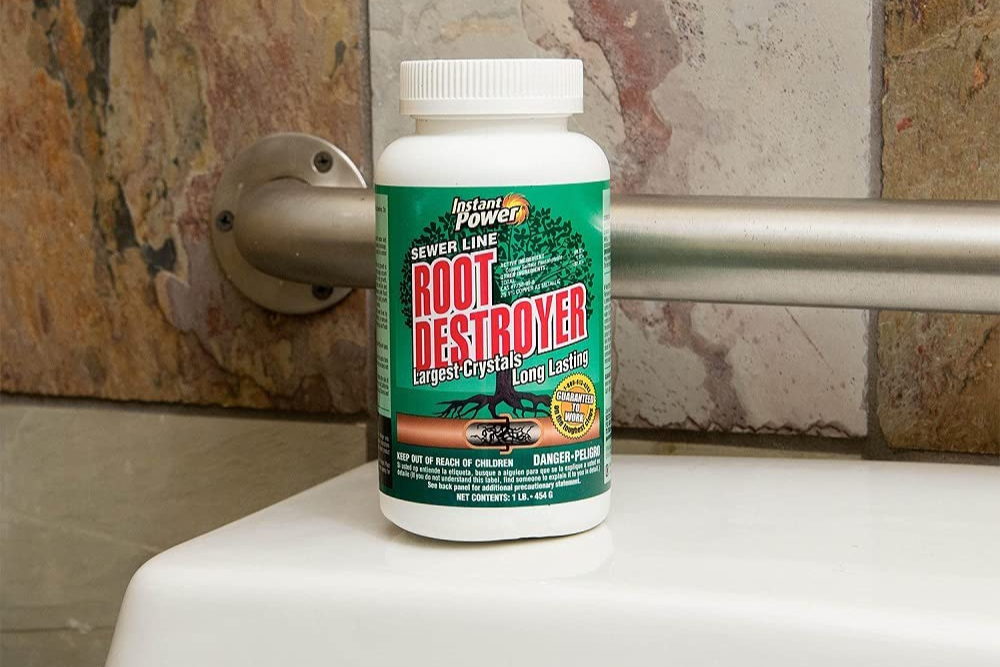
Before Buying a Root Killer for Sewer Lines
Root killers sometimes contain chemicals that can be harmful to the environment. Before deciding to use a root killer to banish tree roots blocking drainpipes, consider nonchemical solutions to this problem.
- Determine the “root” cause: It’s difficult to tell if tree roots are the culprit without digging up the pipes and examining them firsthand. However, there are signs to look for. If you’ve tried other clog-removal remedies that didn’t work, tree roots in the sewer line are likely to blame. Persistent foul odors coming from the drain may also indicate roots are trapping waste in the lines. And if there is a sizable tree within 20 feet of the main sewer drain line, then it’s possible its roots are infringing on the sewer pipe.
- Hire a plumber: A pro can manually remove roots in plumbing that are wreaking havoc on the drain. Although this is a pricey solution, hiring a plumber may be the only option if the problem is severe.
- Rent a sewer snake: A sewer snake is a motorized tool that consists of a long steel cable with a blade at the end. When you turn it on, the cable moves through the pipe, chewing through blockages as it goes. While these machines are expensive, DIYers can rent equipment to snake a drain from a local home improvement store for about $50 for half a day.
- Remove the tree: Although cutting away tree roots may temporarily fix the problem, the roots could grow back, cutting off drainage lines again. If the tree is overgrown or nearing the end of its life, removing it could solve the problem permanently.
- Replace the drain line: If it’s old and crumbling, it may make sense to replace the sewer line entirely, rerouting it to avoid threatening tree roots.
Root Killers for Sewer Lines Comparison
| Product | Form | Application Rate | Active Ingredients |
|---|---|---|---|
| Green Gobbler Foaming Root Killer | Foam | 2-pound increments | Sodium chloride and sodium lauryl sulfate |
| Zep Root Kill | Crystals | ½-pound increments | Copper sulfate |
| Roebic Foaming Root Killer | Foam | 1-pound increments | Dichlobenil |
| Rooto Copper Sulfate Root Killer | Crystals | Not available | Copper sulfate |
| Roebic K-77 Root Killer | Crystals | ⅔-pound increments | Copper sulfate |
| Sanco Industries Root Destroyer | Crystals | ½-pound increments | Copper sulfate |
Our Top Picks
The root killers below include both foaming and copper sulfate products that are proven to work. All options are easy to apply and will typically clear a clogged line in a few days or weeks.
Best Overall
Green Gobbler Foaming Root Killer
Buy at Amazon Buy at The Home Depot Buy at The Green GoblerWhat We Like
- Won’t harm soil or trees
- Simply needs to be flushed down the toilet
- Can use preventatively or on an existing problem
What We Don’t Like
- May require more treatment rounds than a chemical herbicide
Specs
- Form: Foam
- Application rate: 2-pound increments
- Active ingredients: Sodium chloride and sodium lauryl sulfate
A safe yet effective foaming formula, Green Gobbler foaming sewer line root killer clings to roots and dehydrates them, killing them by depriving them of water. It relies on a mix of salt, soap, and baking soda, so it’s safe for the environment. Over the course of a few days, offending tree roots dry out, become brittle, and dissolve.
Applying the root killer is easy. Simply flush 2 pounds of Green Gobbler down the toilet during periods of low use. Once the lines are clear, you can use this foaming tree root killer as an effective preventive for regrowth by treating the pipes once every 2 months.
Get the Green Gobbler root killer for sewer lines at Amazon, The Home Depot, or Green Gobbler.
Best Bang for the Buck
Zep Root Kill
Buy at Amazon Buy at Lowe's Buy at Tractor Supply Co.What We Don’t Like
- Easy to use
- Copper sulfate formula is extremely effective
- Good for preventive maintenance and dealing with an existing issue
What We Don’t Like
- Can harm the environment and corrode metal drains
Specs
- Form: Crystals
- Application rate: ½-pound increments
- Active ingredients: Copper sulfate
Those in need of a cheap fix to a clogged drain may consider this root killer from Zep. It costs less than other products and is easy to apply. Simply add granules to the toilet and flush. When the root killer comes into contact with roots or fungus, it kills them without harming the rest of the tree or any surrounding shrubs. It’s also safe for use with septic systems.
In addition to killing existing roots, Zep will also help prevent future growth of tree roots. Just keep in mind that copper sulfate is its active ingredient, so it should be used sparingly and only when needed to prevent damage to drainage lines.
Get the Zep root killer for sewer lines at Amazon, Lowe’s, Tractor Supply Co., The Home Depot, Walmart, or Zep.
Best Foaming
Roebic Foaming Root Killer
Buy at Amazon Buy at Lowe's Buy at Ace HardwareWhat We Like
- Kills existing roots and prevents new growth
- Safe root kill for septic systems
- Dichlobenil is an effective alternative to copper sulfate
What We Don’t Like
- A bit more costly per use than other options
Specs
- Form: Foam
- Application rate: 1-pound increments
- Active ingredients: Dichlobenil
Roebic foaming root killer uses a copper-free formula to kill roots and keep them from coming back. Once applied, Roebic root killer coats the entire pipe with foam to make full contact with roots. Its active ingredient, the herbicide dichlobenil, will also inhibit future root growth, preventing clogs from recurring.
To apply, dump the entire 1-pound bottle into the toilet and flush several times. It’s safe for all types of plumbing and can be applied twice a year as a preventive to keep root growth from returning. Though Roebic root killer is more effective than some other products, it’s also among the most expensive root killers on the market.
Get the Roebic root killer for sewer lines at Amazon, Lowe’s, Ace Hardware, Tractor Supply Co., The Home Depot, Walmart, or Blain’s Farm & Fleet.
Eco-Friendly Pick
Rooto Copper Sulfate Root Killer
Buy at Amazon Buy at Ace Hardware Buy at WalmartWhat We Like
- Kills roots in sewers, cesspools, drain fields, and septic systems
- Prevents new root growth after initial clearing
- Simple, no-mess application process
What We Don’t Like
- Causes skin and eye irritation; toxic to aquatic life
Specs
- Form: Crystals
- Application rate: Not available
- Active ingredients: Copper sulfate
Rooto’s copper sulfate root killer eliminates tree roots invading sewer and septic lines by killing them on contact, helping restore proper flow and prevent future blockages. The crystals are easy to apply—just pour into your toilet and flush. As they dissolve and travel through the pipes, they target roots without harming the tree itself.
While it’s not an instant fix, you should start to see noticeable improvement within just a couple of weeks. In addition to clearing existing root growth, this septic tank root killer also prevents roots from regrowing and causing the problem to return. While Rooto’s root killer is safe for use in all pipe materials and septic systems, it does not protect pipes from corrosion and should not be used in garbage disposal. Since this copper sulfate formula can irritate your skin and eyes and harm the environment, it should be handled carefully and used sparingly.
Get the Rooto root killer for sewer lines at Amazon, Ace Hardware, or Walmart.
Best Heavy-Duty
Roebic K-77 Root Killer
Buy at Amazon Buy at Ace HardwareWhat We Like
- Fast-acting formula helps remove roots from sewer lines quickly
- Safe for pipes and septic systems
- Straightforward application process
What We Don’t Like
- Requires restricted water use during treatment
Specs
- Form: Crystals
- Application rate: ⅔-pound increments
- Active ingredients: Copper sulfate
Roebic K-77 root killer is an effective chemical solution for clearing and preventing tree and shrub roots from clogging sewer pipes and septic systems in modern homes. Its fast-acting copper sulfate formula targets invasive roots without harming surrounding trees, ground cover, or the natural bacterial balance of septic tanks, making it a good choice for homeowners dealing with recurring root growth.
K-77 application is straightforward: Simply pour the product into the toilet or directly into the septic system as directed, then restrict water use for several hours to maximize effectiveness. You should start to see proper water flow return in as little as 2 days to 2 weeks, depending on the severity of the issue. As with any root killer for drains, if you have a completely blocked system, you may still need to manually clear the roots to fully restore water flow.
Get the Roebic K-77 root killer for sewer lines at Amazon or Ace Hardware.
Also Consider
Sanco Industries Root Destroyer
Buy at Amazon Buy at Sanco IndustriesWhat We Like
- Copper sulfate is a very effective root killer
- Formula specifically targets roots and won’t harm trees and shrubs
- Safe to use in all plumbing types, including septic systems
What We Don’t Like
- Copper sulfate can negatively impact the environment
Specs
- Form: Crystals
- Application rate: ½-pound increments
- Active ingredients: Copper sulfate
Sanco Industries Root Destroyer uses a high concentration of copper sulfate crystals to kill roots growing into a main drainpipe. Application simply involves adding the product to the toilet closest to the main sewer line in half-pound increments and then flushing. Sanco Root Destroyer kills tree roots without harming the tree or any nearby shrubs.
Once roots absorb the copper sulfate—a process that typically takes 3 to 4 weeks—they’ll die, decay, and allow water to flow once again. The formula is also safe to use in a septic tank, and it can be applied up to twice a year to prevent new growth from coming back.
Get the Sanco Industries root killer for sewer lines at Amazon or Sanco Industries.
Or, DIY Your Own Root Killer for Sewer Lines
If you’re worried about how much it costs to hire a plumber and don’t want to put chemicals in your drain unless you absolutely have to, you can try making a DIY root killer from common household ingredients.
The process is simple: Mix 1 cup each of vinegar, baking soda, table salt, and boiling water, and immediately flush it down the toilet. The solution will begin to fizz and foam, allowing the salt to contact the roots, which dehydrates and kills them.
Jump to Our Top Picks
How We Chose the Best Root Killers for Sewer Lines
When making our selections for the best root killers for sewer lines, we considered a variety of criteria. Although effectiveness is certainly important and perhaps the most crucial factor for most people, a good root killer should also be safe for the environment and not present a significant risk to human health.
With that in mind, we included eco-friendly foaming products that have proven effective at killing roots via ingredients with little or no environmental impact. Though not as safe, we did include products that use copper sulfate, which may be necessary for treating certain root problems, though it should be used sparingly and carefully.
What to Consider When Choosing a Root Killer for Sewer Lines
When shopping for the best root killer for sewer lines, consider which type you prefer, how long it will take to work, and any safety issues that apply.
Type
Root killers are herbicides—chemicals that destroy plants or inhibit their growth. They are available in four different formula types: crystal, dust, liquid, or foam. Homeowners can use root killers to destroy existing roots or apply them up to two times per year as a preventive measure.
Copper sulfate, an herbicide found in many root-killing products, comes in crystal, dust, or liquid form. It has the ability to kill tree roots without taking down the entire tree. Unfortunately, copper sulfate works slowly, sometimes taking weeks to clear a clog. If overused, it also has the potential to corrode steel or galvanized pipe walls or even melt plastic pipes. More importantly, copper sulfate also poses a threat to the environment. It can neutralize nutrients and bacteria that aquatic life needs to live, damage crops, and even poison drinking water.
Dichlobenil has a foam formula that fills the pipe and then works to dissolve tree roots. This herbicide is far less toxic than copper sulfate and won’t harm trees and shrubs. Some foaming root killers don’t use dichlobenil, instead opting for eco-safe ingredients such as salt, sodium lauryl sulfate (essentially a detergent), and baking soda.
Time to Work
Unlike drain cleaners, which work in minutes to clear a clog, root killers don’t offer such immediate satisfaction. Foaming tree-root killer takes between 2 and 7 days to dissolve tree roots, depending on how thick the roots are. Copper sulfate can take from 3 to 4 weeks to clear a blockage, depending on the location of the root in the drainage pipe as well as the severity of the blockage.
Safety
Proper safety precautions should be taken when using root killers, as these products typically include chemicals that are hazardous to humans. Both types of root killers can cause eye or skin irritation, so always wear gloves, long sleeves, pants, and eye protection when applying them.
Copper sulfate fumes are also dangerous to breathe in, so take care not to inhale its fumes. Make sure to ventilate the area properly by opening a window or turning on a bathroom fan during use. Though copper sulfate root killers are safe for pipes when used correctly, they must be used sparingly and according to product directions, as overuse can corrode metal pipes or potentially melt plastic polyvinyl chloride, or PVC, pipes.
All root killers are safe for use in septic systems, as they won’t harm the bacterial action in the tank. Some root killers can even be added directly to a septic system to kill off any roots that may be growing into it, though it’s still smart to be thoughtful when installing landscaping around a septic tank to minimize potential issues.
FAQs
If even the best plunger hasn’t done the trick and you need to know how often to apply root killer to prevent blockages in your drainpipes, read on for answers to this and other questions.
A natural chemical herbicide that consists of such ingredients as salt, soap, and baking soda will kill roots quickly, causing them to dry up, become brittle, and wash away. Other herbicides that are very effective at killing tree roots include copper sulfate and dichlobenil.
If using a natural root killer as a preventive, apply it to your pipes once every 2 months to prevent roots from growing into the pipes. For root killer that uses copper sulfate or dichlobenil as an active ingredient, apply it once every 6 months.
We think the Green Gobbler root killer is the best root killer for sewer lines. It uses a foaming formula that clings to the roots, killing them quickly. It’s also easy to apply and relies on natural ingredients, making it eco-friendly as well as effective.
We spoke with Geno Caccia, the CEO of California’s Caccia Plumbing, about which type he prefers. “In my experience, foaming root killer is typically more effective as it coasts the entire inside of the pipe. Copper sulfate on the other hand usually settles at the bottom,” Caccia says. He also points out that “Copper sulfate can take several weeks to show results, and multiple treatments may be needed for significant root intrusion.”
If you’ve already had a drain cleaning service come out to manually clear a fully blocked drainage pipe, copper sulfate can clear the rest of the roots in as little as 2 days to 2 weeks. If the line isn’t entirely blocked and does not need to be manually cleared, it may take just a bit longer since there will likely be more debris needing treatment.
According to Geno Caccia of family-owned and operated Caccia Plumbing, “In recommended doses, copper sulfate is usually safe. However, excessive use can disrupt the balance of bacteria in the septic tank and reduce its effectiveness.”
